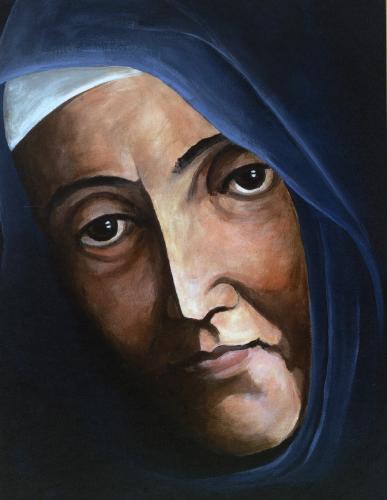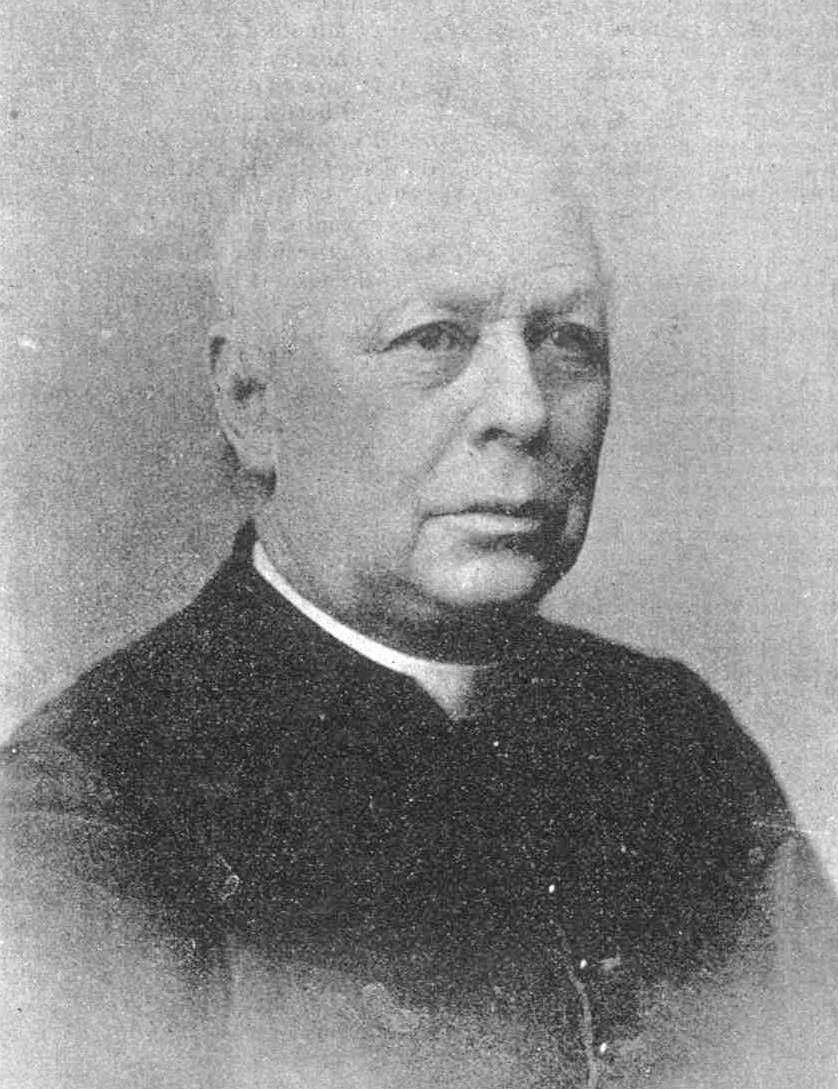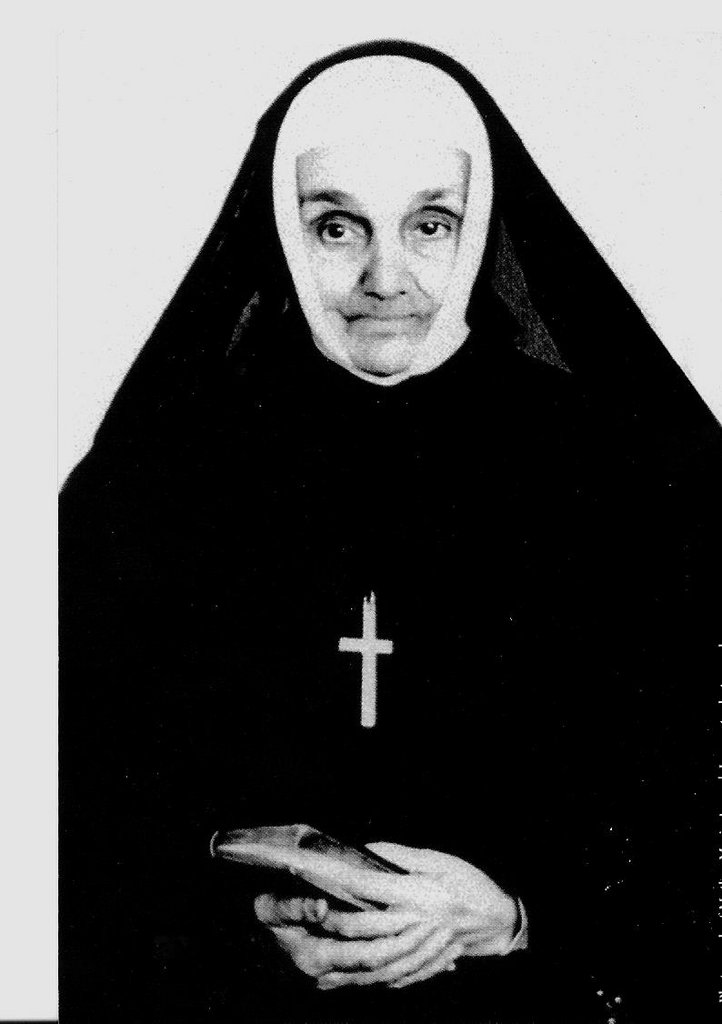
-by Karel Doruyter
Dan 12:23, Mt 5:10
“No money like public money. No love like family love. No politics like Church politics.” -MPM
If you are scandalized, as I am often, by the humanity, the “original sinfulness”, of a Church full of sinners, starting with myself, Rom 3:23, I can offer you little comfort. However, I do think you will find “a better class of losers (sinners)”, with apologies to Mr. Travis, within than without. And, our hope is NOT our own righteousness, but His. Heb 6:19, 1 Cor 15:19.
When you are discouraged, even by your fellow Christians, those whom you KNOW should imitate Him MORE, invoke the aid of Bl Marie-Anne Blondin, SSA. Pray to her to ask Him to give you (and me!, please) strength & perseverance.
Esther Blondin, in religion “Sister Marie Anne”, was born in Terrebonne (Quebec, Canada) on April 18, 1809, in a family of deeply Christian farmers. From her mother she inherited a piety centered on Divine Providence and the Eucharist and, from her father, a deep faith and a strong patience in suffering. Esther and her family were victims of illiteracy so common in French Canadian milieux of the nineteenth century. Still an illiterate at the age of 22, Esther worked as a domestic in the Convent of the Sisters of the Congregation of Notre Dame, that had been recently opened in her own village. A year later, she registered as a boarder in order to learn to read and write. She then became a novice in the Congregation but had to leave, due to ill health.
In 1833, Esther became a teacher in the parochial school of Vaudreuil. Little by little, she found out that one of the causes of this illiteracy was due to a certain Church ruling that forbade that girls be taught by men and that boys be taught by women. Unable to finance two schools, many parish priests chose to have none. In 1848, under an irresistible call of the Spirit, Esther presented to her Bishop, Ignace Bourget, a plan she long cherished: that of founding a religious congregation “for the education of poor country children, both girls and boys in the same schools”. A rather new project for the time! It even seemed quite rash and contrary to the established order. Since the State was in favor of such schools, Bishop Bourget authorized a modest attempt so as to avoid a greater evil.
-the “nemesis”, Rev. Louis-Adolphe Marechal, most in need of God’s mercy! Mt 23.
The Congregation of the Sisters of Saint Anne was founded in Vaudreuil on September 8, 1850. Esther, now named “Mother Marie Anne”, became its first superior. The rapid growth of this young Community soon required larger quarters. During the Summer of 1853, Bishop Ignace Bourget transferred the Motherhouse to Saint Jacques de l’Achigan. The new chaplain, Father Louis Adolphe Marechal, interfered in an abusive way in the private life of the Community. During the Foundress’ absence, Father changed the pupils’ boarding fees. Should he be away for a while, he asked that the Sisters await his return to go to confession. After a year of this existing conflict between the chaplain and the Foundress, the latter being anxious to protect the rights of her Community, Bishop Bourget asked Mother Marie Anne, on August 18, 1854, “to resign”. He called for elections and warned Mother Marie Anne “not to accept the superiorship, even if her sisters wanted to reelect her”. Even though she could be reelected, according to the Rule of the Community, Mother Marie Anne obeyed her Bishop whom she considered God’s instrument. And she wrote: “As for me, my Lord, I bless Divine Providence a thousand times for the maternal care she shows me in making me walk the way of tribulations and crosses”.
Mother Marie Anne, having been named Directress at Saint Genevieve Convent, became the target of attacks from the Motherhouse authorities, influenced by the dictatorship of Father Marechal. Under the pretext of poor administration, Mother Marie Anne was recalled to the Motherhouse in 1858, with the Bishop’s warning: “take means so that she will not be a nuisance to anyone.” From this new destitution and until her death on January 2, 1890, Mother Marie Anne was kept away from administrative responsibilities. She was even kept away from the General Council deliberations when the 1872 and 1878 elections reelected her. Assigned to mostly hidden work in the laundry and ironing room, she led a life of total self-denial and thus ensured the growth of the Congregation. Behold the paradox of an influence which some wanted to nullify! In the Motherhouse basement laundry room in Lachine, where she spent her days, many generations of novices received from the Foundress a true example of obedience and humility, imbued with authentic relationships which ensure true fraternal charity. To a novice who asked her one day why she, the Foundress, was kept aside in such lowly work, she simply replied with kindness : “The deeper a tree sinks its roots into the soil, the greater are its chances of growing and producing fruit”.
The attitude of Mother Marie Anne, who was a victim of so many injustices, initially not even being listed in the directory of sisters, allows us to bring out the evangelical sense she gave to events in her life. Just as Jesus Christ, who passionately worked for the Glory of His Father, so too Mother Marie Anne sought only God’s Glory in all she did. “The greater Glory of God” was the aim she herself gave her Community. “To make God known to the young who have not the happiness of knowing Him” was for her a privileged way of working for the Glory of God. Deprived of her most legitimate rights, and robbed of all her personal letters with her bishop, she offered no resistance and she expected, from the infinite goodness of God, the solution to the matter. She was convinced that “He will know well, in his Wisdom, how to discern the false from the true and to reward each one according to his deeds”.
Prevented from being called “Mother” by those in authority, Mother Marie Anne did not jealously hold on to her title of Foundress; rather she chose annihilation, just like Jesus, “her crucified Love”, so that her Community might live. However, she did not renounce her mission of spiritual mother of her Community. She offered herself to God in order “to expiate all the sins which were committed in the Community”; and she daily prayed Saint Anne “to bestow on her spiritual daughters the virtues so necessary for Christian educators”.
Like any prophet invested with a mission of salvation, Mother Marie Anne lived persecution by forgiving without restriction, convinced that “there is more happiness in forgiving than in revenge”. This evangelical forgiveness, guarantee of “the peace of soul which she held most precious”, was ultimately proven on her death bed when she asked her superior to call for Father Marechal “for the edification of the Sisters”.
As she felt the end approaching, Mother Marie Anne left to her daughters her spiritual testament in these words which are a resume of her whole life : “May Holy Eucharist and perfect abandonment to God’s Will be your heaven on earth”. She then peacefully passed away at the Motherhouse of Lachine, on January 2, 1890, “happy to go to the Good God” she had served all her life.
Prayer to Blessed Marie-Anne Blondin
Lord, you gave to
Blessed Marie-Anne Blondin
a heart impassioned for Your glory
and You called her to serve with tenderness
the young, the poor, and the sick.
You gave her hope
in the most difficult moments in her life
and You led her to deep serenity.
Be praised, Lord,
for your humble servant.
Blessed Marie-Anne Blondin.
Through her intercession
grant us favor
that we ask of You with confidence. Amen.
Prayer of the Elderly
Blessed Marie-Anne Blondin
you, like us, lived
through the stages of a long life,
and so we come to you with confidence.
Through the events
that continue to mark our lives,
help our faith grow even stronger
and our love more unselfish.
In seeing us, may others find peace
and renew their courage.
You, who lived in absolute trust
of the heavenly Father,
free us from fear.
Help us, even now,
experience the joy
promised to people of good will. Amen.
“Model of a humble and hidden life, Marie-Anne Blondin found interior strength by contemplating the cross, showing us that the life of intimacy with Christ is the surest way to give fruits mysteriously and fulfill the mission willed by God.”
-Pope John Paul II at the beatification of Blessed Marie-Anne
Love,
Matthew



